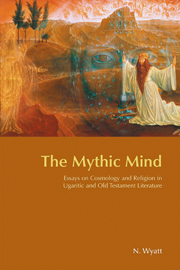Book contents
- Frontmatter
- Contents
- Preface
- Acknowledgments
- Abbreviations
- Chapter 1 THE PROBLEM OF THE ‘GOD OF THE FATHERS’
- Chapter 2 THE DEVELOPMENT OF THE TRADITION IN EXODUS 3
- Chapter 3 THE SIGNIFICANCE OF THE BURNING BUSH
- Chapter 4 WHO KILLED THE DRAGON?
- Chapter 5 SEA AND DESERT: SYMBOLIC GEOGRAPHY IN WEST SEMITIC RELIGIOUS THOUGHT
- Chapter 6 SYMBOLS OF EXILE
- Chapter 7 OF CALVES AND KINGS: THE CANAANITE DIMENSION IN THE RELIGION OF ISRAEL
- Chapter 8 THE DARKNESS OF GENESIS 1.2
- Chapter 9 THE SIGNIFICANCE OF SPN IN WEST SEMITIC THOUGHT: A CONTRIBUTION TO THE HISTORY OF A MYTHOLOGICAL MOTIF
- Chapter 10 THE VOCABULARY AND NEUROLOGY OF ORIENTATION: THE UGARITIC AND HEBREW EVIDENCE
- Chapter 11 THE MYTHIC MIND
- Chapter 12 ‘WATER, WATER EVERYWHERE…’: MUSINGS ON THE AQUEOUS MYTHS OF THE NEAR EAST
- Chapter 13 ANDROGYNY IN THE LEVANTINE WORLD
- Bibliography
- Index of References
- Index of Names and Places
Chapter 1 - THE PROBLEM OF THE ‘GOD OF THE FATHERS’
- Frontmatter
- Contents
- Preface
- Acknowledgments
- Abbreviations
- Chapter 1 THE PROBLEM OF THE ‘GOD OF THE FATHERS’
- Chapter 2 THE DEVELOPMENT OF THE TRADITION IN EXODUS 3
- Chapter 3 THE SIGNIFICANCE OF THE BURNING BUSH
- Chapter 4 WHO KILLED THE DRAGON?
- Chapter 5 SEA AND DESERT: SYMBOLIC GEOGRAPHY IN WEST SEMITIC RELIGIOUS THOUGHT
- Chapter 6 SYMBOLS OF EXILE
- Chapter 7 OF CALVES AND KINGS: THE CANAANITE DIMENSION IN THE RELIGION OF ISRAEL
- Chapter 8 THE DARKNESS OF GENESIS 1.2
- Chapter 9 THE SIGNIFICANCE OF SPN IN WEST SEMITIC THOUGHT: A CONTRIBUTION TO THE HISTORY OF A MYTHOLOGICAL MOTIF
- Chapter 10 THE VOCABULARY AND NEUROLOGY OF ORIENTATION: THE UGARITIC AND HEBREW EVIDENCE
- Chapter 11 THE MYTHIC MIND
- Chapter 12 ‘WATER, WATER EVERYWHERE…’: MUSINGS ON THE AQUEOUS MYTHS OF THE NEAR EAST
- Chapter 13 ANDROGYNY IN THE LEVANTINE WORLD
- Bibliography
- Index of References
- Index of Names and Places
Summary
The significance of the formula ‘the god of my father(s)’ and variants, which was the subject of A. Alt's important monograph, has been discussed intermittently since, but without the problems involved having been resolved entirely satisfactorily. In what follows, I wish to offer a new explanation for the problems, which is consistent with current scholarly estimates of the other evidence in Genesis concerning ‘patriarchal religion’.
A. Alt was writing before the discovery of the Ugaritic texts had led to a complete reappraisal of the nature of the god El, and was able, in the fashion of the time, to dismiss the various El-forms found in Genesis as local numina. The ‘god of the fathers’, however, was felt to point to the distinctive feature in patriarchal religion, the cult of a god revealing himself to the cult-founder and being worshipped by subsequent generations conscious of their historical link with the founder.
J. Lewy suggested that the apparently anonymous ‘god of the fathers’ could be identified with El Shaddai, on the basis of Genesis 49.25, where 'ēl ' abîkâ and šadday are parallel. However, his interpretation involved understanding the 'ēl in the former phrase as a generic in the construct (i.e. the equivalent of the prose form 'elōhê), and required the alteration of the 'et preceding šadday into 'ēl. The former suggestion begs the question concerning the generic use of 'ēl, while the latter seems unnecessary.
- Type
- Chapter
- Information
- The Mythic MindEssays on Cosmology and Religion in Ugaritic and Old Testament Literature, pp. 1 - 5Publisher: Acumen PublishingPrint publication year: 2005



